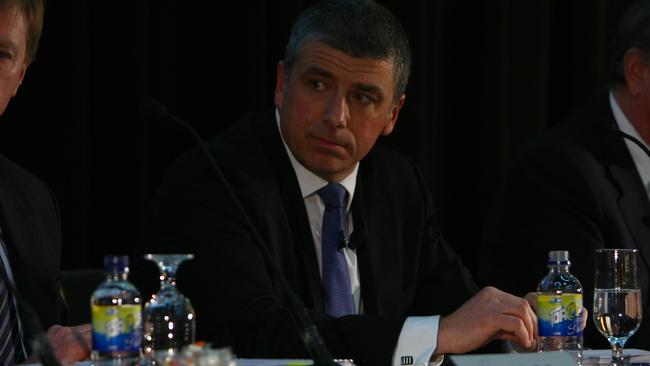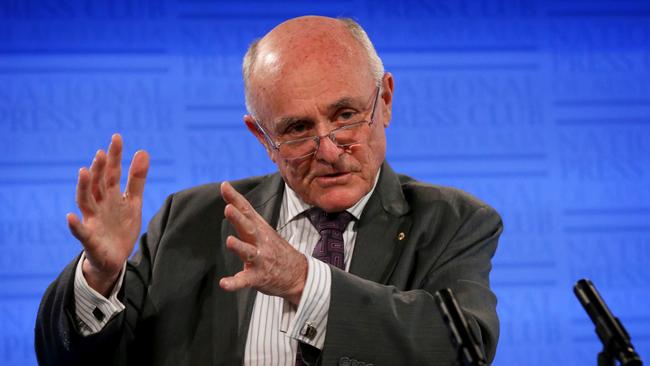Panel member says ‘jury is out’ on whether 7-Eleven can survive without underpaying staff
7-ELEVEN, spooked that it could be forced to repay up to $100 million to exploited workers, is now trying to weasel its way out.
THE head of the now-axed panel responsible for compensating victims of the 7-Eleven wage fraud scandal says the company stood by while franchisees ran a “dreadful campaign of intimidation” to prevent claimants coming forward.
Professor Allan Fels AO, former chairman of the Australian Competition and Consumer Commission, said 7-Eleven had been “far too soft” on franchisees.
“I haven’t seen an adequate clamping down, and therefore I think the culture still falls significantly short of what is required to clean it up,” he said.
Earlier this week, 7-Eleven abruptly axed the independent panel over fears it may have to pay out up to $100 million in compensation from the rapidly rising number of cases.
The company instead replaced it with an in-house system to assess “valid” claims.
That has raised fears that the personal information of the claimants, provided to the panel on the condition of anonymity, will now fall into the hands of 7-Eleven.
Prof Fels believes most of 7-Eleven’s 20,000 workers over the past decade have been underpaid by about half, often under threat of deportation.
To date the panel has received around 3000 claims of underpayment and made determinations in 421 cases amounting to $16.7 million, with the average payout close to $40,000.
Around $10 million of those claims have been paid, and the panel says it was still receiving around 100 new cases each week at the time it was axed.
Newly installed 7-Eleven chief executive Angus McKay blamed the decision on workers trying to defraud the company and “game the system”.
“If people have got the information needed by the secretariat to get a claim through, it will go through,” Mr McKay told 3AW on Thursday.
“[But] I am absolutely going to listen to any intelligence I get out there that says people are trying to game the system.”
But Prof Fels rejected that assertion, describing the claims as “thinly supported”.
“They failed to come up with any evidence after months of us asking,” he said
“[Eventually] they gave us 12 suspect cases, and on having a look we found nothing there. For the first time last night they floated the idea of an organised ring of fraudsters — they never, ever put that to us.”

Prof Fels said the claims of fraud appeared to be based on one of the applicants giving advice to other applicants on how to go about making claims.
“If that’s a crime, most of the legal and consulting profession in Australia would be in jail,” he said.
Mr McKay rejected Prof Fels’ claim that 7-Eleven wanted to get out of paying the money.
“I will respectfully say Allan is wrong,” Mr McKay said.
Mr McKay was accused of lying about sacking the panel, after 7-Eleven originally said the panel had “agreed to transition” the claims process.
“We’re getting into the semantics here,” Mr McKay said.
Mr McKay admitted claimants would now need a higher standard of proof and revealed the internal process would take months to be finalised.
On Thursday, the Fair Work Ombudsman expressed “concern” the decision by 7-Eleven to terminate the panel, noting that it had “active, ongoing investigations into a number of 7-Eleven franchisees”.
“There is also a real prospect that we will take legal action against more 7-Eleven operators,” Fair Work Ombudsman Natalie James said in a statement.
Since 2009, the FWO has taken eight 7-Eleven franchisees to court, one of which resulted in a record penalty of $214,000.
“We are yet to be satisfied that 7-Eleven is meeting the expectations we have of it following the public release of our findings on April 9,” she said.
“We look forward to hearing the detail of how the critical work of the Fels Panel will be continued under the new arrangements announced by 7-Eleven yesterday.”
CAN 7-ELEVEN SURVIVE?
Prof Fels said he was “agnostic” about whether the new profit sharing franchise agreements introduced late last year would work.
After the wage fraud revelations came to light, the company overhauled its business model which previously saw 57 per cent of profit go to head office and 43 per cent to franchisees.
Under the revised model, stores now take different splits based on their profit, delivering an average of 4.5 per cent increase in income — about $30 million overall — to the 620 store operators, Fairfax reported.

“I certainly believe that the former model was not workable for numerous franchisees unless there was underpayment,” Prof Fels said. “The new profit sharing model may work, it may not.”
He said he would be “surprised if there is not a reversion to some of the underpayment practices of the past with franchisees, feeling they’ve had the triumph of having the panel removed”.
He pointed to 7-Eleven’s long history of issues with the FWO dating back to 2008.
“The board has been there for a long time, and there have been previous big challenges to which it has not responded successfully,” he said. “So I’m worried about how sustained the current response of the board is.”
Professor David Cousins AM, the second member of the panel and former executive director of consumer affairs with the Victorian Department of Justice, said the “jury is out” on whether the disgraced convenience chain has a future in Australia.
He said there was still systemic wage fraud occurring among 7-Eleven franchisees.
“It’s clear that a number of franchisees are still struggling as a result [of the wage fraud crackdown],” he said.
“They often can’t afford to pay award wages, [which is why] they’ve been using the people they’ve been using. We’ve heard stories of people losing their jobs.
“There’s still quite a bit of underpayment going on via cashback and other schemes, not to the same extent but it’s still happening.”
Prof Cousins said the model presumes many of the franchisees will be running the stores themselves hands-on without much paid labour.
“The question is how sustainable that is in the longer-term, and if it’s not sustainable it’s going to lead to more pressure to revert to the practices of the past,” he said.
He described the decision to axe the panel as a “pretty cold calculus”.
“They’ve walked away from it when we started to get to the rub of the exercise, which was the payout of claims,” he said.
“I think that saw they couldn’t do much worse in terms of where their brand image was at the moment.”



